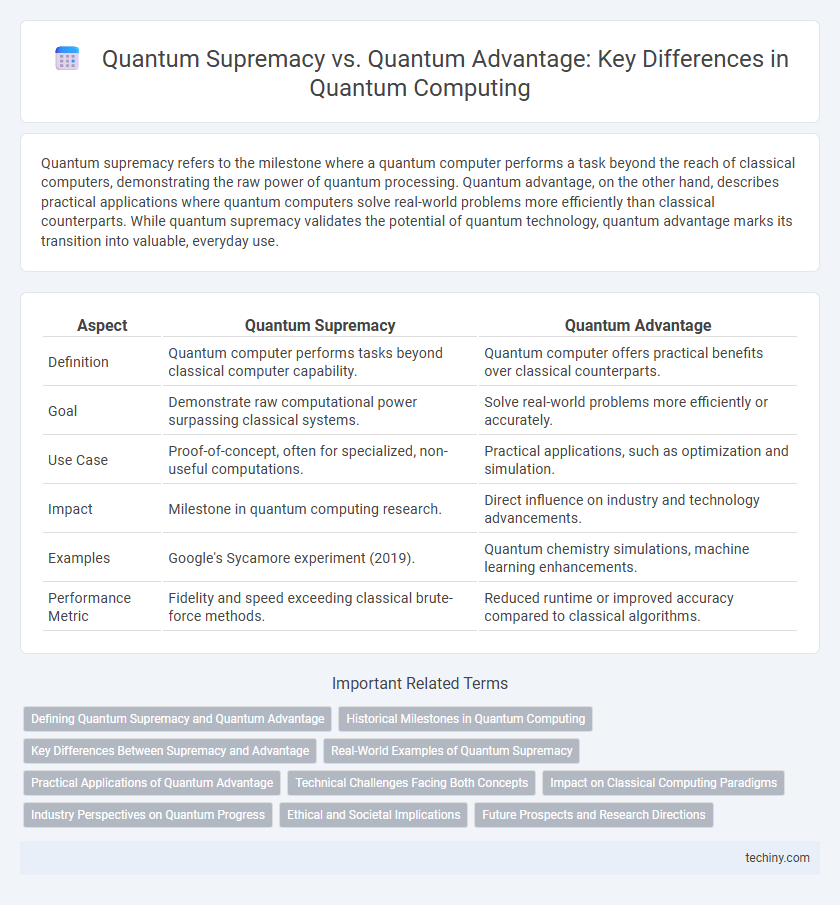Quantum supremacy refers to the milestone where a quantum computer performs a task beyond the reach of classical computers, demonstrating the raw power of quantum processing. Quantum advantage, on the other hand, describes practical applications where quantum computers solve real-world problems more efficiently than classical counterparts. While quantum supremacy validates the potential of quantum technology, quantum advantage marks its transition into valuable, everyday use.
Table of Comparison
| Aspect | Quantum Supremacy | Quantum Advantage |
|---|---|---|
| Definition | Quantum computer performs tasks beyond classical computer capability. | Quantum computer offers practical benefits over classical counterparts. |
| Goal | Demonstrate raw computational power surpassing classical systems. | Solve real-world problems more efficiently or accurately. |
| Use Case | Proof-of-concept, often for specialized, non-useful computations. | Practical applications, such as optimization and simulation. |
| Impact | Milestone in quantum computing research. | Direct influence on industry and technology advancements. |
| Examples | Google's Sycamore experiment (2019). | Quantum chemistry simulations, machine learning enhancements. |
| Performance Metric | Fidelity and speed exceeding classical brute-force methods. | Reduced runtime or improved accuracy compared to classical algorithms. |
Defining Quantum Supremacy and Quantum Advantage
Quantum supremacy refers to the milestone where a quantum computer performs a specific task impossible for classical supercomputers within a reasonable time frame. Quantum advantage occurs when a quantum device demonstrates practical, real-world benefits by solving problems more efficiently than classical counterparts. Defining these concepts highlights the distinction between theoretical breakthroughs and tangible improvements in computational performance.
Historical Milestones in Quantum Computing
Quantum Supremacy, first demonstrated by Google's Sycamore processor in 2019, marked a pivotal moment by performing a specific task faster than the most powerful classical supercomputers. Quantum Advantage refers to the broader goal of practical, real-world applications where quantum computers outperform classical systems, evidenced by recent developments in error correction and optimization algorithms. Historical milestones such as Shor's algorithm in 1994 and the realization of qubits in various physical systems laid the foundation for these breakthroughs, driving ongoing progress in quantum computing.
Key Differences Between Supremacy and Advantage
Quantum supremacy refers to a quantum computer performing a task that classical computers cannot solve in a reasonable time, demonstrating computational superiority without practical application. Quantum advantage occurs when a quantum device not only outperforms classical systems but also provides tangible benefits for real-world problems, such as optimization or cryptography. The key difference lies in supremacy proving theoretical computational limits, while advantage delivers useful, implementable solutions beyond classical reach.
Real-World Examples of Quantum Supremacy
Quantum supremacy occurs when a quantum computer solves a problem that is practically impossible for classical supercomputers, demonstrated by Google's Sycamore processor outperforming classical machines in 2019 by completing a specific sampling task in 200 seconds versus 10,000 years. Quantum advantage, however, focuses on quantum devices delivering practical benefits in real-world applications, such as optimization problems in logistics or material simulations, which remain an active area of development. Real-world examples like Google's experiment highlight the theoretical milestone of supremacy rather than immediate quantum advantage in commercial use cases.
Practical Applications of Quantum Advantage
Quantum advantage demonstrates practical superiority of quantum computers in solving real-world problems like drug discovery, optimization, and cryptography, surpassing classical methods. Unlike quantum supremacy, which marks theoretical milestones often limited to contrived tasks, quantum advantage targets commercial and scientific applications with tangible benefits. Industries increasingly leverage quantum algorithms to enhance machine learning models and materials simulation, translating quantum potential into economic value.
Technical Challenges Facing Both Concepts
Quantum supremacy refers to a quantum computer performing a specific task beyond classical capabilities, while quantum advantage implies practical improvements in real-world applications. Technical challenges for quantum supremacy include managing error rates and maintaining qubit coherence over extended computations, whereas quantum advantage demands scalable quantum architectures and fault-tolerant algorithms. Both face hurdles such as qubit fidelity improvements, error correction overhead, and hardware-software co-design to achieve reliable and efficient quantum processing.
Impact on Classical Computing Paradigms
Quantum supremacy marks the milestone where quantum computers perform specific tasks beyond the reach of classical supercomputers, challenging traditional computational limits. Quantum advantage goes further by delivering practical benefits in real-world applications such as cryptography, optimization, and material science, effectively surpassing classical algorithms in efficiency. The impact on classical computing paradigms includes a paradigm shift towards hybrid architectures and novel algorithmic strategies aimed at leveraging quantum capabilities while overcoming their current limitations.
Industry Perspectives on Quantum Progress
Quantum supremacy demonstrates a quantum computer performing a task beyond classical capabilities, serving as a key milestone in quantum computing research. Industry leaders emphasize quantum advantage, where practical benefits emerge in real-world applications such as optimization, cryptography, and drug discovery. Businesses invest heavily in developing quantum advantage technologies, aiming to transform industries by solving complex problems more efficiently than classical systems.
Ethical and Societal Implications
Quantum supremacy marks the first demonstration of a quantum computer performing a task beyond classical capabilities, raising ethical concerns about disparities in access to quantum technologies that could exacerbate digital divides. Quantum advantage refers to practical, real-world applications where quantum systems provide significant benefits, highlighting societal implications such as enhancing cryptography or accelerating drug discovery while demanding robust frameworks for data privacy and equitable technology deployment. Both milestones necessitate ethical governance to address potential misuse, economic disruptions, and ensure inclusive benefits across global communities.
Future Prospects and Research Directions
Quantum advantage signifies practical improvements in solving real-world problems using quantum algorithms, whereas quantum supremacy demonstrates a quantum computer performing tasks beyond classical reach without immediate application. Future research prioritizes developing error-corrected qubits, scalable architectures, and hybrid quantum-classical algorithms to transition from supremacy proofs to actionable advantage. Emerging focus areas include fault-tolerant quantum computation and improving coherence times to unlock broader industrial and scientific use cases.
Quantum Supremacy vs Quantum Advantage Infographic

 techiny.com
techiny.com